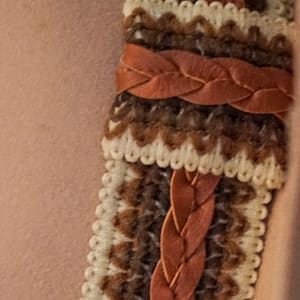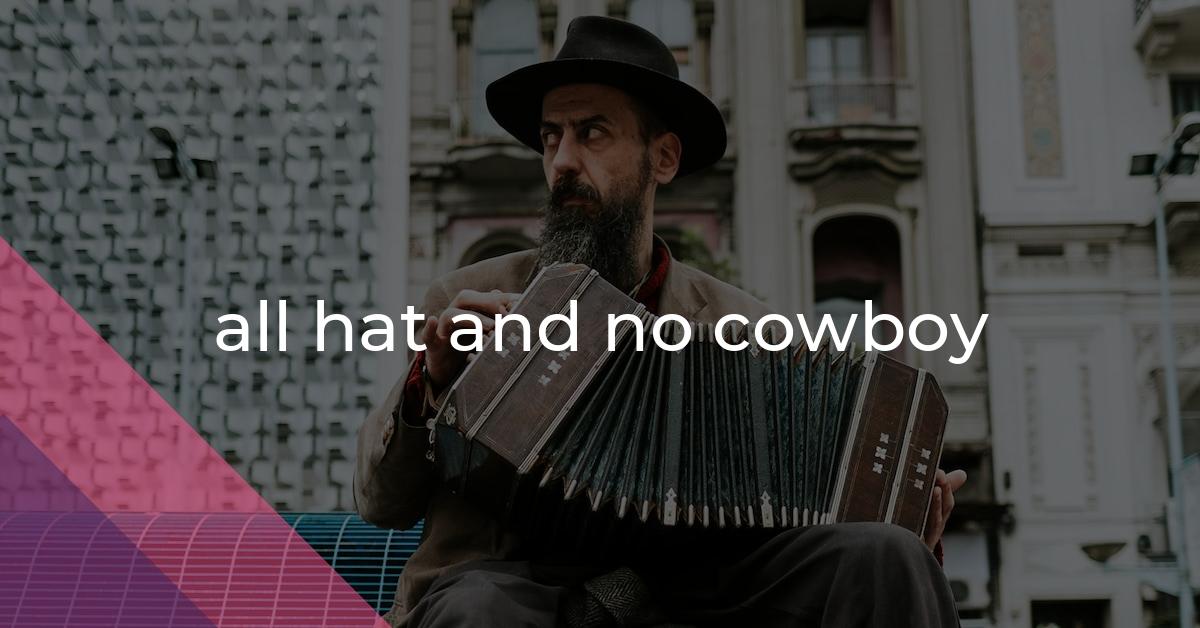all hat and no cowboy: Idiom Meaning and Origin
What does ‘all hat and no cowboy’ mean?
The idiom "all hat and no cowboy" means someone who talks confidently or boasts about something, but lacks the skills or experience to back it up.

Idiom Explorer
The idiom "jill of all trades" refers to a person who has a variety of skills or can perform multiple tasks competently.
The idiom "jack of all trades, master of none" refers to someone who has superficial knowledge or skills in many areas but is not exceptionally skilled or knowledgeable in any particular one.
The idiom "horse's ass" refers to someone who is foolish, incompetent, or makes a fool of themselves. It is often used to criticize someone's behavior or actions, implying that they are behaving stupidly or in a ridiculous manner.
"High horse" is an idiom that means someone is being arrogant, self-righteous, or condescending. It is often used to criticize someone who acts superior or looks down on others.
The idiom "high and mighty" means that someone is arrogant, haughty, or acting superior to others. It refers to someone who thinks they are better or more important than everyone else.
The idiom "hats off" is used to show admiration or respect for someone. It is often used when acknowledging someone's achievement or talent.
The idiom "full of it" means to be speaking insincerely or to be exaggerating or lying about something.
The idiom "full of hot air" means someone who talks a lot but doesn't say anything of substance or value. It refers to someone who is not trustworthy or reliable in their words or promises.
The idiom "feather in one's cap" means to have an achievement or accomplishment that one can be proud of or use to enhance their reputation.
The Misleading Mirage
The idiom "all hat and no cowboy" is an American expression used to describe individuals who portray themselves as tough, skilled, or experienced in a certain field, but in reality, lack the substance to back up their claims. It is often used to criticize those who have an inflated sense of their own abilities or expertise.
The origins of this idiom can be traced back to the American cowboy culture, particularly in the American West during the late 19th and early 20th centuries. Cowboys, with their distinct attire of wide-brimmed hats, boots, and spurs, came to symbolize rugged, independent, and skilled individuals capable of handling the challenges and dangers of the Wild West.
Using this imagery, the idiom "all hat and no cowboy" suggests that someone may have the outward appearance associated with being a cowboy, like wearing a hat, but lacks the genuine qualities and skills that make them a true cowboy. In essence, they are putting on a show or pretending to be something they're not.
This idiom has become ingrained in American English and is frequently used to criticize individuals or situations where there is a disconnect between appearance and reality. It is often employed in political discussions to deride politicians who make grand promises but fail to deliver on them.
The idiom "all hat and no cowboy" serves as a warning to be cautious and skeptical of those who make extravagant claims or present themselves as experts without the actual skills or knowledge to back it up. It emphasizes the importance of substance over style and reminds us not to be deceived by appearances.
Another similar idiom is "all mouth and trousers," which is of British origin. It conveys a similar meaning, suggesting that someone talks a lot but fails to take action or live up to their words. While the two idioms have different origins, they share the common theme of criticising individuals who lack the substance to support their claims.
Similarly, the idiom "all hat and no cattle" is another variant of the expression. This idiom specifically refers to individuals who claim to be ranchers or cattle breeders, but do not actually own any livestock. The phrase implies that these individuals are all talk and no action, pretending to be involved in the cattle industry without the knowledge or experience to back it up.
Both "all mouth and trousers" and "all hat and no cattle" are related to the idiom "all hat and no cowboy" in that they highlight a disconnect between someone's outward appearance or claims and their true abilities or expertise. These idioms serve as reminders to be skeptical of those who make impressive claims without the substance to support them.
Overall, the idiom "all hat and no cowboy" is a vibrant and evocative expression that draws upon the imagery of the American cowboy to criticize individuals who lack the genuine abilities or qualities they claim to possess. It acts as a cautionary reminder to look beyond surface-level appearances and value substance over style. Although its origins lie in the American West, its usage has extended beyond cowboy culture and become a widely recognized idiom in American English.
Example usage
Examples of the idiom "all hat and no cowboy": 1. He talks a big game about being a successful businessman, but he's really all hat and no cowboy. 2. Sarah's new boyfriend claims to be a skilled guitar player, but when she asked him to play, it was clear he was all hat and no cowboy. 3. The candidate promises to bring about significant change, but based on his track record, it seems like he's just all hat and no cowboy. Analysis:
The idiom "all hat and no cowboy" is used to describe someone who appears or claims to be skilled, experienced, or knowledgeable in a certain area, but lacks the actual ability or expertise to back it up. It is derived from the image of someone wearing a cowboy hat, a symbol of the American West, but lacking the skills or qualities traditionally associated with a cowboy.
More "Expression" idioms



